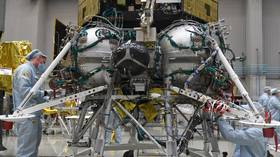Moon mission makes ‘hard landing’
A Moon-landing mission spearheaded by a Tokyo-based tech firm appears to have been unsuccessful, with the company saying its unmanned craft likely made a “hard landing” on the lunar surface after a total loss of communication.
While the Japanese company, ispace, hoped to make history with the first commercial Moon landing on Tuesday, it said the robotic Hakuto-R lander stopped transmitting data shortly after the scheduled touchdown time and has not been in contact with mission control since.
“We have to assume that we could not complete the landing on the lunar surface,” ispace founder and CEO Takeshi Hakamada said on a livestream after the attempt, adding that the company would continue efforts to contact the lander.
We’ve received another incredible photo from the camera onboard our Mission 1 lander!Seen here is the lunar Earthrise during solar eclipse, captured by the lander-mounted camera at an altitude of about 100 km from the lunar surface. (1/2) pic.twitter.com/pNSI4lPnux
— ispace (@ispace_inc) April 24, 2023
The company offered a lengthy update on the status of the mission later on Tuesday, saying there is a “high probability that the lander eventually made a hard landing on the Moon’s surface.” It noted that its engineers would produce a “detailed analysis” of the data acquired before the landing sequence to better understand what went wrong.
Though the company did not achieve all of its goals, Hakamada said it had “acquired a great deal of data and experience by being able to execute the landing phase,” and that the new data would be used for a second Moon mission planned for 2024.
The attempted landing was a multinational project, with ispace working with Elon Musk’s SpaceX to launch its lander atop a Falcon 9 rocket last December. The Hakuto-R also carried a lunar rover (called ‘Rashid’) developed in the United Arab Emirates, as well as another robot created by Japan’s space agency.
After lifting off from a SpaceX launch site in Cape Canaveral, Florida, the craft separated from the rocket and started its long drift toward the Moon, taking three months to enter lunar orbit. To conserve fuel, the company chose a slower route with a massive, sweeping trajectory, which took the spacecraft 1.5 million kilometers (930,000 miles) from Earth at its furthest point.
For ispace’s 2024 mission, it plans to deploy at least one lunar rover for “surface exploration and data collection,” while yet another attempt scheduled for 2025 will be made alongside NASA’s Commercial Lunar Payload Services program, which aims to work with private industry to advance space exploration.
To date, only the government space agencies of the US, the former Soviet Union, and China have successfully touched down on the Moon. An Israeli company attempted to do so in 2019, but its Beresheet spacecraft crashed on the lunar surface.
You can share this story on social media:








Comments are closed.